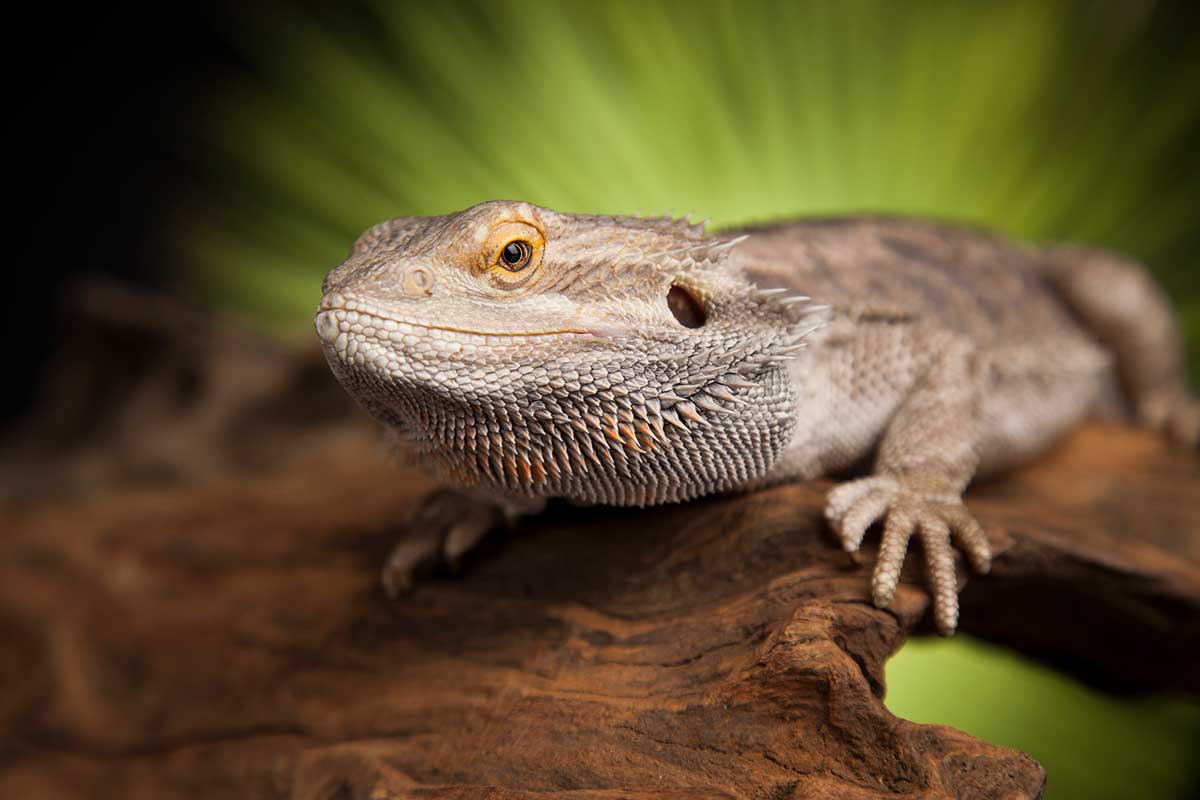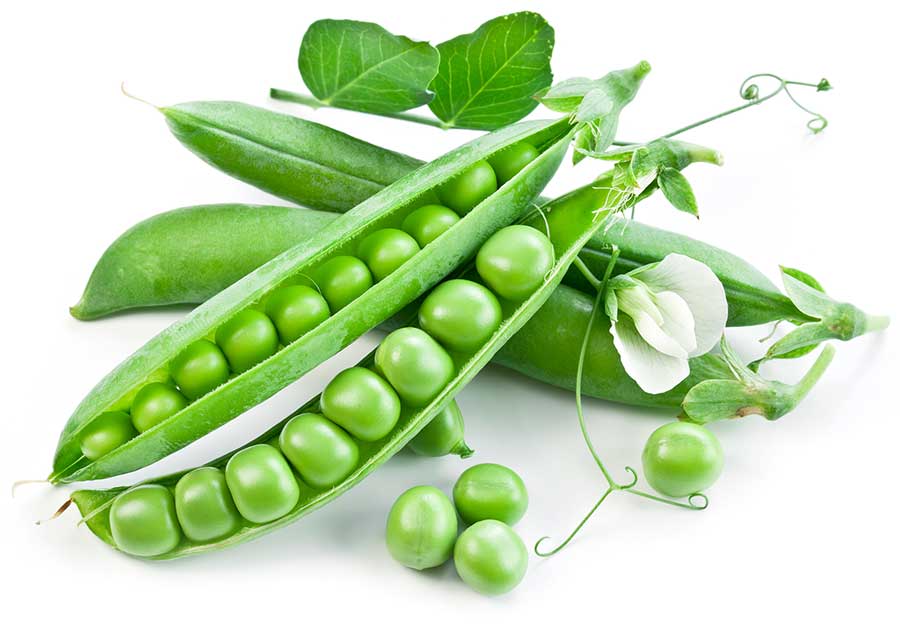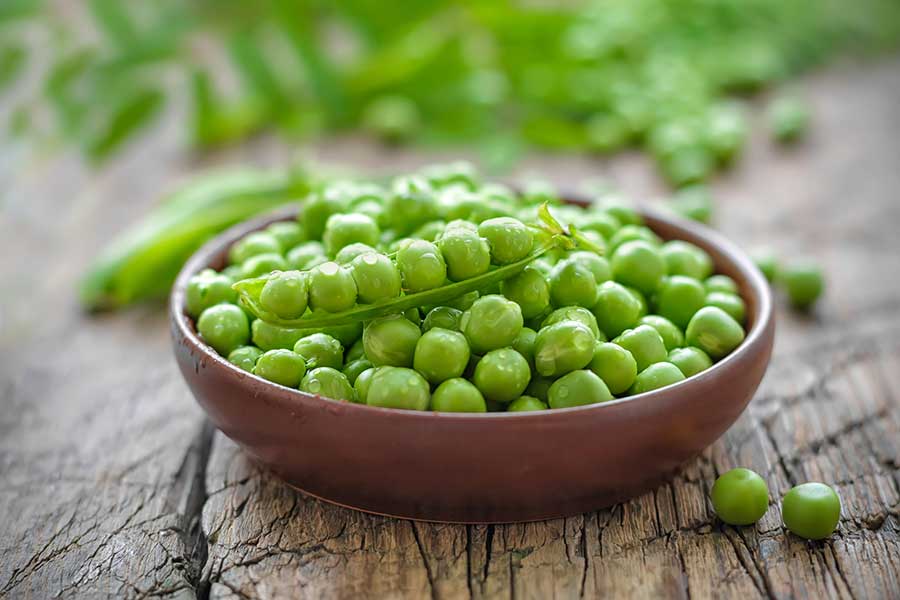Can Bearded Dragons Eat Peas?

Bearded dragons can eat peas in moderation as treat items on the odd occasion.
This is because not all vegetables are created equal, and while peas provide excellent dietary fiber, they also have a lot of oxalates and phosphorus, which both affect
Bearded dragons need to have a varied diet that includes different colors, textures, nutrients, and tastes to keep them interested in eating as well as fit and healthy. However, not all green things that appear healthy for humans are good for beardies.
However, peas are sweet, they taste great, they are accessible, and bearded dragons seem to enjoy them, so including them in your bearded dragon’s diet now and then will benefit them in different ways. This article will help you understand how to incorporate peas into your bearded dragon’s diet safely.
Read on to understand how peas can fit into your bearded dragon’s diet or what you can supplement them with!
Prepare Peas for Your Bearded Dragon
Peas can come fresh, frozen, or canned. In general, it is always best to serve your bearded dragon fresh vegetables when you get the chance. This is because any process to preserve or prolong the life of vegetables, such as freezing, will reduce the amount of nutrition the product has.
However, you cannot always find fresh peas at the grocery store. The next best option is frozen peas. Frozen peas are flash frozen, so the majority of their nutrition is kept intact and can be passed on to your bearded dragon.
However, the option of tinned or canned peas is always there on the shelves. The problem with canned items is that they are usually preserved in brine or oil. These contain way too much salt, oil, or synthetic preservatives to be healthy for bearded dragons and should be avoided at all costs.
Always wash your peas before giving them to your bearded dragon. Even if the label says ‘organic,’ there is still a chance they have been sprayed with chemical or ‘natural’ herbicides, pesticides, or insecticides that are harmful to reptiles and will cause your beardie serious harm.
Nutritional Information of Peas
‘Peas’ refers to a whole bunch of different types of vegetables. Beardie owners may wonder if their dragon can eat snow peas, sugar snap peas, snap peas, or garden peas and what the actual difference is between them all!
Snow peas, garden peas, and sugar snap peas are all different varieties of the same type of legume. They are small, round, or flattened peas in a pea pod. Your bearded dragon can eat all of these varieties, peas, and pods!
Peas are high in dietary fiber and water. This means they are very good for flushing out the system.
Peas are also high in sugars, which makes them very tasty to humans and dragons! Sugar snap peas are the favorite of the bunch for bearded dragons. This is because they are sweet, refreshing, and extra crunchy.
Unfortunately, peas are also high in phosphorus and oxalates. This is what makes them big no-nos as a staple veggie for bearded dragons, but I’ll get into that in more detail a bit later.
These round, green veggies are small but highly nutritious and pack a vitamin punch, being high in vitamins A and K, which are vital for bearded dragons.

Nutritional Benefits of Peas for Bearded Dragons
Peas provide excellent health benefits to bearded dragons. They are full of water and are a good source of dietary fiber. Peas are also high in vitamins A and K. These are vital vitamins for bearded dragons, and they need plenty of sources of them.
Vitamin A
Vitamin A will help your bearded dragon build and maintain healthy skin, bones, teeth, and organs. This is especially important for bearded dragons because they shed their skin fairly frequently and constantly need to grow and maintain healthy skin.
Bearded dragons are also at constant risk of respiratory infections. Vitamin A helps maintain healthy mucus membranes that are found in the respiratory system, which helps your bearded dragon stay healthy.
Vitamin K
Vitamin K is a vital nutrient for all animals. The group of vitamins that make up vitamin K all help blood to clot. If your bearded dragon scrapes itself, catches and tears its nail out, or bites down on something and scratches its gum, the blood needs to be able to clot.
If the blood cannot clot, then your bearded dragon is at an increased risk of bleeding out from small wounds or bleeding internally.
Hydration
Many bearded dragons do not recognize standing water as water at all and can dehydrate even with a full water dish in their enclosure. Fortunately, they get most of their hydration from their food.
Peas are very high in water content and will provide an excellent hydration boost for your bearded dragon.
However, this is a double-edged sword as too much water in the diet can cause upset stomachs and diarrhea in beardies.
Fiber
Dietary fiber is essential for maintaining your beardie’s gut health. Peas are a great source of dietary fiber.
Fiber acts as a broom and ‘sweeps’ the gut clear of any old food that is lingering and fermenting which causes severe intestinal distress. This helps to prevent impaction and keeps your beardie’s bowel movements regular.
Nutritional Disadvantages of Peas for Bearded Dragons
Although they’re a tasty snack for bearded dragons, there is a nasty side to peas that makes them unsuitable as a staple food item. In addition to being a bit high in water, they’re also unfortunately very high in oxalates and phosphorus.
Oxalates and Phosphorus
All legumes are high in oxalates. Additionally, peas have a poor
Peas may be high in
Peas have a
What Should Your Bearded Dragon Eat with Peas?
To create the best diet for your bearded dragon, you should understand why certain foods are good and bad for them so you can balance out the bad with extra good.
Peas should be used as a topper in your bearded dragon’s daily salad and should never form the staple part of the dish. They should only make an appearance in your beardie’s salads twice a week at most and in very small amounts.

In addition to this salad topper, you should have a staple green like collard greens, mustard greens, or arugula making up 50% of the meal for an adult.
An additional 20% of the salad should be made up of other healthy greens and vegetables.
Some great options include:
- Yellow and orange squash
- Zucchini blooms
- Bell peppers
- Endive
- Escarole
- Watercress
- Carrots
The remaining 30% or so of the salad should be made up of 20% insect protein and 10% fruit and flowers.
For a baby bearded dragon, their diet will be 70% insect protein, 20% greens, and vegetables, and 10% fruits and flowers. As they age, this ratio will gradually flip to 70% greens and vegetables, 20% insect protein, and 10% fruits and flowers.
If you are adding peas to the salad, make sure to dust it with
Other Great Alternatives to Peas
Instead of peas, look for healthier alternatives to offer your bearded dragon that are just as yummy but will not steal all of their precious
In addition to these, there are many different alternatives to peas that offer great nutritional value as well as a better
For a more intensive look at what your bearded dragon can eat, have a look at our guides on the best worms, the best insects, the best greens, and the best fruit to feed bearded dragons.
Conclusion
Bearded dragons can eat peas. However, they should only be fed in moderation as salad toppers now and then instead of as a staple vegetable. This is because they are high in phosphorus and oxalates.
Foods that are high in phosphorus and oxalates put your bearded dragon at risk of developing metabolic bone disease because the oxalates and phosphorus bind to
That is why your bearded dragon must have a well-balanced and varied diet of healthy greens, vegetables, and some fruit to meet all of their dietary and enrichment needs.

